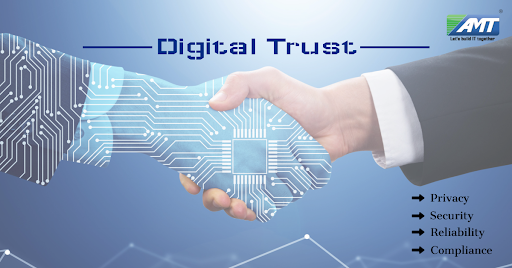Digital trust refers to the confidence and belief that individuals, organizations, and systems have in the security, reliability, and authenticity of digital interactions, transactions, and information sharing. In the context of the modern digital age, where much of our personal and professional lives are conducted online, digital trust plays a crucial role in ensuring the smooth functioning of various activities. Here are some key aspects of digital trust:
- Security: Trust in digital systems relies heavily on security measures. Users must feel confident that their data and information are protected from unauthorized access, breaches, and cyberattacks. This involves encryption, strong authentication methods, and robust cybersecurity practices.
- Privacy: Users want to be assured that their personal data is handled responsibly and in accordance with privacy regulations. Companies and organizations need to be transparent about their data collection and usage practices to maintain trust.
- Reliability: Digital trust also encompasses the reliability of digital systems and services. Users should have confidence that the services they use will be available and perform as expected, minimizing downtime and disruptions.
- Authentication and Identity: Verifying the identity of users and entities involved in digital transactions is essential for trust. Techniques such as multi-factor authentication (MFA) and digital signatures help establish trust in the identities of users and the integrity of data.
- Transparency: Openness and transparency in business practices, data handling, and algorithms contribute to digital trust. Users want to know how decisions are made and how their data is used.
- Compliance: Organizations must comply with legal and regulatory frameworks related to data protection, cybersecurity, and privacy. Compliance helps build trust by demonstrating a commitment to following established standards and regulations.
- Trustmarks and Certifications: Trust can be enhanced through third-party certifications and trustmarks. These indicate that a product or service has been independently assessed and meets certain security and quality standards.
- User Education: Educating users about online security best practices and how to protect their digital identities can also help build trust. Informed users are more likely to make safe choices online.
- Incident Response: How organizations handle security incidents and data breaches can significantly impact trust. A well-prepared incident response plan can mitigate damage and rebuild trust more effectively.
- Blockchain and Decentralization: Blockchain technology is often associated with enhancing digital trust, particularly in financial and supply chain applications. Its decentralized and immutable nature can provide a high level of confidence in data integrity.
- AI and Trust: As artificial intelligence becomes more prevalent, ensuring trust in AI systems is crucial. This includes transparency in AI decision-making, addressing bias, and explaining how AI systems work.
Digital trust is a dynamic and evolving concept, influenced by technology advancements, regulatory changes, and shifts in user expectations. Building and maintaining digital trust is essential for individuals, businesses, and institutions to thrive in the digital age.
Above is a brief about Digital Trust. Watch this space for more updates on the latest trends in Technology.
